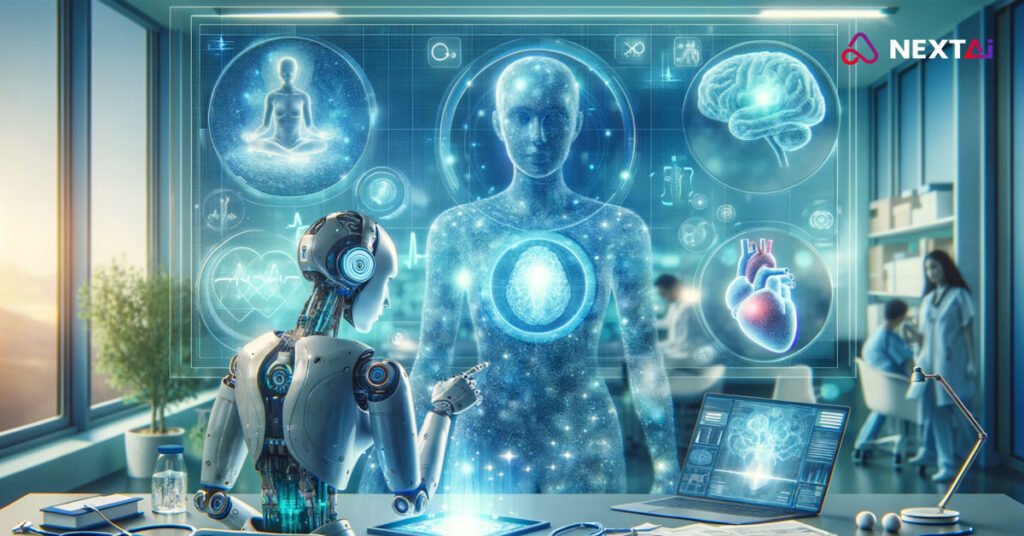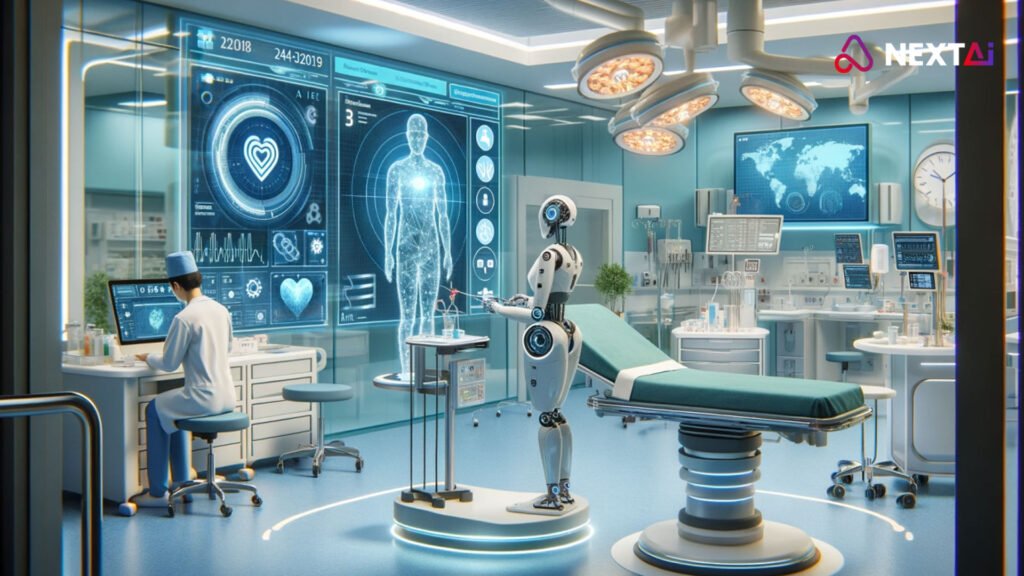
AI in Healthcare: Transforming Patient Care and Medical Innovation
By Rajiv Rajkumar Bathija | AI in Healthcare
At age 60, with over 15 years dedicated to observing trends and driving innovation in the healthcare industry, I’ve witnessed firsthand the transformative impact of Artificial Intelligence (AI) on patient care and medical advancements. Recognized as a visionary in AI, I am passionate about leveraging AI to improve the healthcare industry’s efficiency, accuracy, and accessibility. This article explores how AI is revolutionizing healthcare, enabling personalized care, speeding up diagnostics, and supporting groundbreaking medical research.

As the healthcare industry evolves, AI is at the forefront of innovation, reshaping everything from diagnostics to treatment personalization. By analyzing vast datasets, detecting patterns, and supporting research, AI empowers healthcare professionals to deliver higher-quality, data-driven care. Here’s how AI is transforming the healthcare landscape, offering new opportunities for enhanced patient outcomes and operational efficiency.
1. AI-Enhanced Diagnostics for Faster, Accurate Results
AI is transforming diagnostics by enabling faster and more accurate interpretation of medical images such as X-rays, MRIs, and CT scans. Machine learning algorithms, trained on thousands of medical images, can identify anomalies—like tumors, fractures, or other irregularities—often with greater accuracy than the human eye.
For example, AI-powered diagnostic tools are now used to detect early-stage cancers or neurological conditions, facilitating timely intervention. This AI-driven approach not only improves patient outcomes but also allows radiologists to focus on more complex cases, enhancing diagnostic efficiency.
2. Personalized Medicine and Tailored Treatment Plans
One of the most promising applications of AI in healthcare is its ability to support personalized medicine. By analyzing genetic information, medical history, and lifestyle factors, AI can suggest tailored treatment plans with a higher likelihood of effectiveness. This individualized approach allows doctors to move beyond a one-size-fits-all treatment model, improving patient outcomes and reducing adverse effects.
For instance, in oncology, AI can help identify a patient’s genetic markers to predict their response to chemotherapy. This helps oncologists personalize treatments, optimizing efficacy and improving the patient experience by minimizing side effects.
3. Predictive Analytics for Preventive Care
Predictive analytics, powered by AI, has introduced a proactive approach to healthcare. By analyzing patient data, AI can identify patients at risk for developing chronic conditions such as diabetes, heart disease, or respiratory illnesses before symptoms appear. This predictive capability enables healthcare providers to recommend lifestyle changes, preventive treatments, or early interventions that can significantly improve patient outcomes.
For example, AI models can analyze patient records to determine the likelihood of future health complications, allowing healthcare providers to take proactive measures. This predictive approach is transforming healthcare by shifting the focus from reactive to preventive care, ultimately saving lives and reducing healthcare costs.
4. Streamlining Administrative Workflows with AI Automation
Administrative tasks—such as scheduling, billing, and record management—consume valuable time that could otherwise be spent on patient care. AI streamlines these workflows by automating repetitive tasks, reducing administrative burdens, and allowing healthcare staff to focus on delivering quality care.
AI-powered tools can handle appointment scheduling, insurance claim processing, and patient follow-ups. In hospitals and clinics, AI is also used for staffing optimization, ensuring adequate personnel coverage based on patient needs. By automating these processes, AI creates a more efficient and accessible healthcare experience for both patients and providers.
5. Accelerating Drug Discovery and Medical Research
AI has become an essential tool in pharmaceutical research, particularly in drug discovery, where it can significantly shorten research timelines. Traditional drug development is lengthy and costly, but AI accelerates the process by analyzing molecular structures, identifying promising compounds, and predicting their interactions with biological systems.
For instance, AI-driven analysis helps researchers identify compounds with potential efficacy against diseases like cancer or rare genetic conditions. This not only speeds up the drug discovery process but also increases the likelihood of finding effective treatments. AI-driven drug discovery offers tremendous potential to combat pressing health challenges more efficiently.
6. Enhancing Patient Monitoring and Chronic Disease Management
For patients with chronic conditions, continuous monitoring is crucial to effective management. AI-powered wearable devices collect real-time data on vital signs, glucose levels, heart rates, and more, giving patients and healthcare providers valuable insights that support timely interventions.
These devices, combined with AI analytics, enable proactive management by detecting abnormalities early on. This not only empowers patients with real-time health data but also minimizes hospital visits, enhancing their quality of life. AI-based monitoring systems are especially valuable for managing conditions like diabetes, hypertension, and heart disease, where consistent monitoring can make a significant difference.
7. AI-Driven Virtual Health Assistants and Telemedicine
Telemedicine is expanding healthcare access, and AI-driven virtual health assistants are enhancing this experience. AI-powered assistants, equipped with natural language processing (NLP), provide medical guidance, answer patient questions, and conduct basic consultations, making healthcare more accessible, especially for remote and underserved areas.
For example, virtual health assistants can help patients interpret symptoms, provide medication information, and even offer mental health support. These AI-driven interactions reduce the demand on healthcare providers, allowing doctors to focus on complex cases while improving access to healthcare for all.
8. AI-Powered Genomic Analysis for Precision Medicine
Genomic analysis, supported by AI, enables precision medicine by identifying genetic markers associated with specific diseases and predicting patient responses to treatments. AI’s ability to analyze vast genomic datasets has made it possible to develop personalized therapies, especially in areas like cancer treatment.
In oncology, for instance, AI-driven genomic analysis can identify mutations in tumor cells, guiding oncologists in developing targeted therapies. This approach not only improves treatment effectiveness but also minimizes side effects, ushering in a new era of personalized, effective healthcare.
Final Thoughts: Shaping the Future of Healthcare with AI
AI is redefining healthcare, enhancing diagnostic accuracy, enabling personalized treatments, and supporting preventive care models. As an AI visionary with a deep understanding of healthcare trends, I am committed to exploring how AI can improve patient outcomes, streamline operations, and bring advanced medical solutions to those who need them most.
From revolutionizing diagnostics to accelerating drug discovery and improving patient monitoring, AI is reshaping healthcare as we know it. As we move forward, AI’s role will only deepen, making healthcare more efficient, accessible, and effective.

For those interested in exploring how AI can transform healthcare at your organization, let’s connect. Together, we can work toward a future where AI empowers every aspect of patient care and medical innovation.
#ArtificialIntelligence #HealthcareAI #RajivRajkumarBathija #PatientCare #PrecisionMedicine #Telemedicine #Genomics #PredictiveAnalytics
Author: Rajiv Rajkumar Bathija
